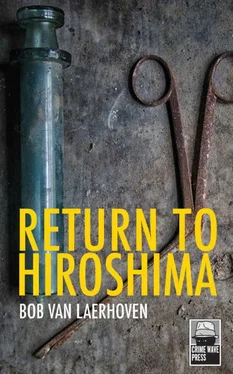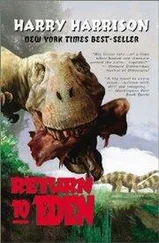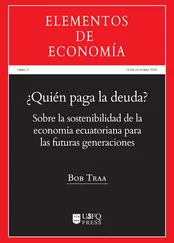“My daughter consulted you. You told her she had a phantom pregnancy. She refused to believe you. You sent her away. What kind of doctor are you? Have you no eyes? Have you no ears? Surely you were able to diagnose my daughter’s affliction?”
Tears appear in Dr Kanehari’s eyes. An arm, long, with thick knobbly ligaments enters his field of vision. Words are whispered in his ear. Then he panics, bites his tongue. A pair of hands, broad, out of proportion, take hold of the doctor’s head. A face hovers above him. Kanehari opens his eyes wide and then closes them.
“Do you understand why you must die?”
A pinkish froth appears in the corners of Kanehari’s mouth.
“Death is a problem, don’t you think?” The voice has dropped in pitch, sounds like crickets on a summer night. “We should be aware of our mortality at every moment of our lives. It’s what transforms our existence into a continuous stream of choices.”
The voice laughs, heartily, with a hint of self-mockery. “You’ve made your choices, I’ve made mine. When the gods decide to punish us they first drive us insane then they kill us. But I was treated like a god from the day I was born. How do you punish divinity? Let me tell you: with lucid insanity. As a result I’ve spent my entire existence struggling with the same question: what kind of life should I live? ”
Beads of sweat roll over the doctor’s temples. Powerful lights blind him. The straps holding him down are tight.
The man behind Kanehari stands up straight. His voice sounds further away. “During my years of isolation I studied the magnificent laws of the universe and then I explored the hidden features of butoh from the perspective of depth psychology . If the laws of entropy and the feigned insanity of butoh, our most elevated dance form, are so similar, what does that tell us? That affliction is fundamental and universal. We devour each other, driven by the misery we afflict on ourselves. I devoured myself for years. But I finally concluded: if I’m a god, I’m also fated to be a demon. I withdrew from the world, embraced immobility, now I’m on the hunt. What am I hunting? My destiny, the pinnacle of self-affliction.”
Dr Kanehari wants to object, argue back, tell the man behind him that his bizarre monologue is a manifest sign of mental illness. The gag in his mouth prevents him.
“How to live?” The voice sighs. “It’s my obsession. But in your case, Kanehari, the tables are turned. How to die? Death in butoh is the essence of thinking and being, a magical moment to be savoured with respect. Do you know who died with a smile on his face? The great Sergei Diaghilev. ‘It’s not wasting any time…” were his final words. Do you know what the worst thing is? Dying slowly! What do you think? Do you deserve a quick death? I don’t think so. Most of our deeds in this world are futile and passing, ripples on a pond as it were. But there are moments in a man’s life when his deeds seal his fate. That’s what happened to you, Kanehari. Submit to your fate with dignity.”
Kanehari tugs like a man possessed at the straps holding him to the operating table. The veins in his neck swell and he shakes his head back and forth.
“That’s not the reaction I was hoping for,” says Rokurobei.
A broad bony hand with fingers like drumsticks draws the scalpel across Dr Kanehari’s throat. The doctor gags, gasps for air. Rokurobei examines the depth of his incision and calculates how long it will take for death to claim him victim. Kanehari deserves an hour, he muses, before he chokes in his own blood.
Hiroshima – the Suicide Club squat – Kabe-cho – Mitsuko – morning, March 14th 1995
The dreams I’ve had since I moved in to this old warehouse seem more real than the life I’m trying to remember. The ground beneath my feet is kicked away and I’m carried off on a tide of memories the colour of mud, flashes of the past that confuse me. I’ve a feeling that the other members of the Suicide Club don’t trust me. I dissect their every snigger as if my life depends on it. Behind all the light-hearted badgering and the group ethic they’ve developed – perhaps without even realising it – there’s a whirlpool of sexual tension, hidden jealousies and power games. It makes me turn in on myself all the more. There’s little come and go between myself and the other young people here, except with Yori. But even then there’s something contradictory about her. Yori is affected and unpredictable, but she can also be incredibly kind and sensitive. She apparently spent the night somewhere else, as did Reizo. I haven’t a clue where they are. I dozed off for a moment during the night and dreamt that Yori kissed me. It wasn’t the kiss that woke me with a start, but the tongue that the dream-Yori traced across my cheek and propped into my throat. It turned out to be forked and pale, like the tongue of a lizard I surprised under a stone as a child on Hashima Island.
Now I’m exactly the same as that lizard: I’m sitting under my stone, hiding, not daring to come out. The members of the Suicide Club have dispersed once again, chattering like sparrows, to steal, cheat, manipulate, live off the street for the rest of the day. I stay behind on my own, scared to go out.
My existence doesn’t seem to parallel the reality that’s now trying to take hold of me with brute force. I just had a look at Yomiuri Shimbun and saw pictures of the people who died during the spectacular bank raid in Hiroshima. The headlines read: crisis makes bank robbers merciless.
One of the victim’s lifeless faces was a Yuzonsha. His name was Tomio Shiga, the ceo of one of the biggest banks in Japan.
Shiga. Isn’t that Reizo’s surname?
Coincidence?
Hiroshima – Harry’s Bar – Ebisu-cho – police doctor and Takeda – lunchtime, March 14 th1995
“The only place in the city you can get a decent margarita.” Police Dr Adachi takes a satisfied sip from his glass. The dreary, poorly lit café is reminiscent of a classical 1950s hotel bar, with wood panelling and dark red carpets, a huge bar in the form of a horseshoe and barmen squeezed into immaculate suits rumbaing as they shake their cocktails.
Adachi is crazy about kitsch. Takeda is staring absent-mindedly at a bunch of noisy tourists who waggle into the place one after the other like geese. He prefers the working-class districts to downtown Hiroshima where the hip and trendy have their fun, but he forgives Adachi this minor peculiarity, which he apparently needs to make him feel eccentric.
“I need another one after what you told me,” Adachi continues, winking at the barman. He peers at Takeda through the fringe of lank hair hanging over his eyes. He thinks his haircut makes him look younger. Takeda has spotted that Adachi fancies one of the barmen, young, porcelain features, self-assured smile. “It was stupid of me to go back and confront the boss,” he says. “Takamatsu’s young and didn’t get where he is now by accident. The man’s a shark and he’s got a serious appetite.”
“And a big mouth with teeth made of steel,” Adachi adds. His expression turns serious: “You’ve heard them clanging together often enough, Akio. So what happened to your self-control? Tut, tut.”
The men only use each other’s first names when they’re alone together.
“I couldn’t control myself. He had no reason to humiliate me like that.”
“Pig-head half-caste Dutchman.” The police doctor laughs thinly. “But you’re right: there’s something weird going on. The bank raid is too big a case for the local boys, yet the National Guard doesn’t seem to be interested. The same kind of thing happened ten years ago… a political murder if memory serves. After a couple of months it went off the radar.”
Читать дальше












